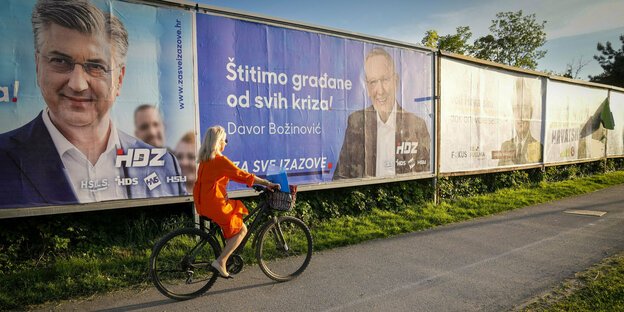The parliamentary elections in Croatia are about nothing less than the future of Europe. And more support for Ukraine.

Election posters of the conservative party HDZ in Zagreb Photo: Darko Bandic/ap
SARAJEVO taz | Overshadowed by internal political crises, NATO and EU member Croatia will hold parliamentary elections on Wednesday. There are 151 seats to be filled in the Seym, Croatia's parliament, and Prime Minister Andrej Plenković's ruling conservative HDZ party could have the advantage. However, the government is being challenged by the social democratic party SDP, led by president Zoran Milanović along with other smaller opposition parties.
Milanović is doing everything he can to surpass Plenkovic and achieve power. He also wants to fish the right bank. Milanović will therefore run directly in the elections to obtain a parliamentary mandate. As prime minister, he hopes for an increase in power. As president, his populist and antidemocratic foreign policy accents were meaningless. After Milanović called elections, he launched himself into the electoral campaign of the social democratic SDP.
But the Constitutional Court intervened and declared that Milanović must first resign as president in order to run for a seat in parliament. However, he ignored the Constitutional Court's decision, remained in office and continued his election campaign for the SDP-led party alliance.
But: with this decision to dissolve Seym as president and call new elections, Milanović embarks on a difficult power game. The courts must make a final decision on this matter. At the moment everything is still working as it should. The elections will take place on Wednesday. In recent years, Plenković has proven to be a reliable partner for the EU in the eyes of Brussels.
Omens of the EU elections and the presidential elections
On the Ukraine issue he has sided with the West, while Milanović is not averse to Russian positions and often agrees with the Hungarian head of state, Orbán, and the new Slovak leaders in their criticism of Europe. If elected, Milanović would be a source of uncertainty for the liberal democracies of the Balkans. Most polls predict an HDZ victory. However, he did not have a majority to be able to govern alone.
But the parties of the right-wing conservative camp are prepared. Furthermore, Plenković will not hesitate to form a coalition with the Serbian party, as he has done so far. If the HDZ remains in power, Croatia is likely to maintain its pro-Western course and, above all, stick to aid to Ukraine. A success for the SDP could lead to further successes for Milanović in the EU Parliament elections in June and the presidency in December.
According to polls, Plenković can expect 60 seats in parliament, while the SDP is projected to win just over 40 seats. The right-wing conservative parties Most and DP could each count on 10 percent of the 4.5 million eligible voters. Only 22 percent are said to have voted for the SDP, while the left-wing green party Mosemo, which represents the mayor of Zagreb, will get between 8 and 9 percent nationwide.
Elections without political content
But Milanović is not completely desperate. On the Bosnian question, he has surpassed Plenković on the right and is in cahoots with the Serbian nationalists and Milorad Dodik. Plenković's allies in Bosnia, the HDZ-BiH under Dragan Čović, have it too, but we will see what the Bosnian Croats decide, who are not happy with Plenković's course in Ukraine.
Political expert Žarko Puhovski criticizes the fact that the elections have no political content. “We didn't have any discussion. Milanović canceled the program. Plenković has gone in the same direction.” He believes that the SDP and HDZ are more similar than ever, but points to the attitude in the Ukraine war. “There is only Hungary between us and Ukraine, we are not that far away, not that it is none of our concern,” he said.
